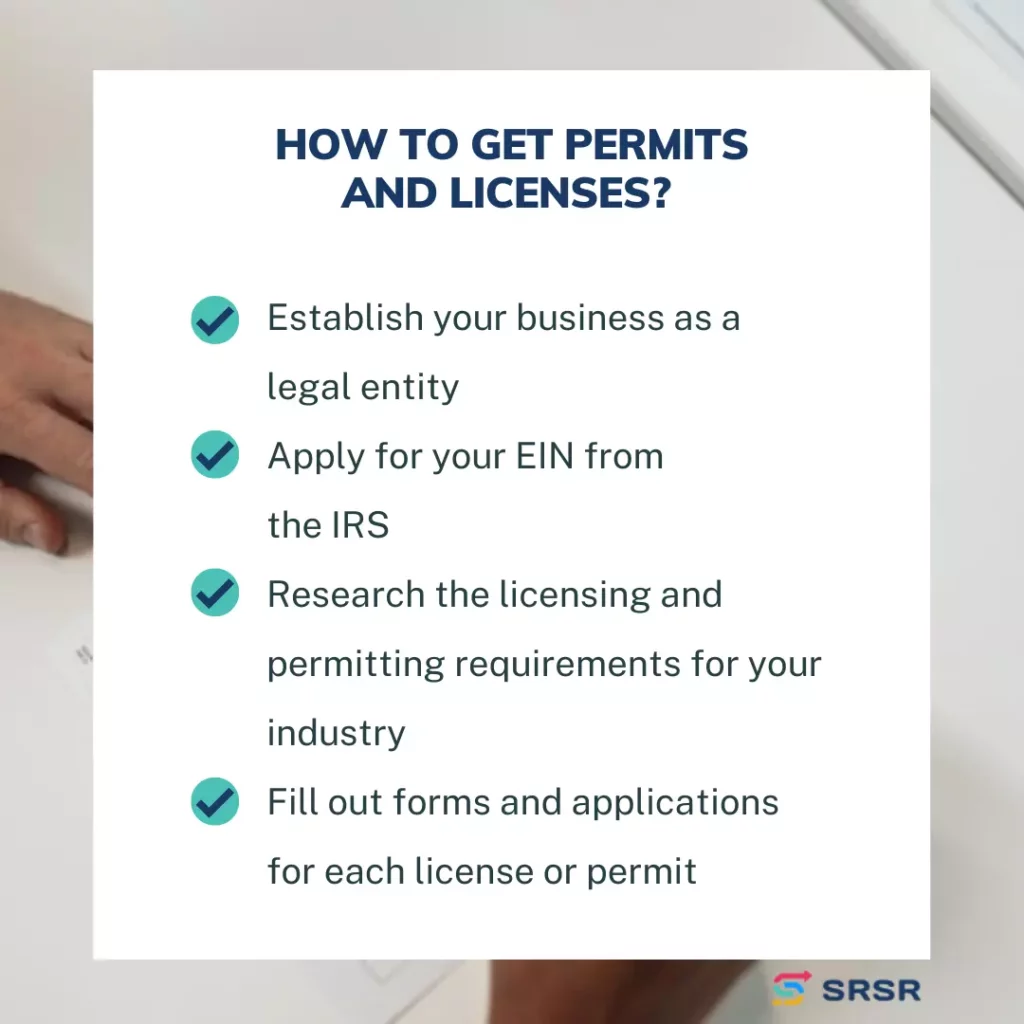You have the passion to bring an idea to life and start a new business. When starting on this exciting adventure, don’t overlook the important first step of obtaining the necessary licenses and permits. Determining the right business permits may not excite you in the same way as finding a physical space or landing your first customer. Still, you risk hefty fines, legal troubles, and even business closure if you fail to get the correct licenses and permits. This article helps you navigate the regulations and requirements to make your business a reality.
What is the difference between a permit and a license?
While people often use “business permit” and “business license” interchangeably, they do have different meanings. What licenses or permits you’ll need will vary depending on your business type and where it’s located. Still, you’ll need to understand the distinctions between these two essential documents for starting your business.
A business license is usually issued by a government agency, such as a city or state. The license allows your business to operate in a particular jurisdiction and is required for most businesses. Think of it like a driving license. If you don’t have one, driving is prohibited.
Licenses tend to be longer-term or permanent, with few restrictions once you have the license. For the different types of business licenses, which we’ll discuss in more detail next, you’ll complete an application and pay a fee.
A business permit allows your business to engage in a specific activity, such as selling alcohol or building a restaurant. Permits are common requirements for businesses operating in highly regulated industries or engaging in activities that could pose a potential risk to public health or safety. Permits are often more short-term than licenses, with your business needing to meet requirements for renewal.
When applying for business permits, you may need to supply additional documentation, such as proof of insurance or specialized training. The types of permits required of your business vary depending on legal and regulatory requirements for your industry and location.
Importance of permits and licenses for business start-ups

Start your business on a solid footing by first learning your obligations and applying for the appropriate documents. Failing to do so risks fines, penalties, and legal liabilities. After all, permits and licenses are there to ensure certain standards are met, such as building codes, safety regulations, or environmental regulations.
The appropriate business permits and business licenses also lend your business start-up legitimacy. Obtaining these documents can help build trust with customers, suppliers, and investors. You’re demonstrating that you value and comply with federal, state, or local standards meant to help prevent accidents, protect the health and safety of employees and customers, and minimize the risk of legal liabilities.
Even if you’re starting a home-based business or your business will run online, you still need the proper licenses and permits to operate a compliant business.
Types of business licenses
The main types of business licenses can vary depending on the jurisdiction and the type of business activity. Nevertheless, common types of licensing include:
- General business license: This license allows a business to operate in a particular jurisdiction. Typically required for most businesses, this license covers a range of activities.
- “Doing business as (DBA)” license: Maybe your registered business name is too long or too dull for your branding purposes. In that case, you may need a DBA for the shorter, catchier brand name you are going to be using to conduct business.
- Professional license: Individuals who provide professional services, such as doctors, lawyers, architects, or accountants, are required to obtain a professional license. This licensing procedure can be more stringent than for a general business license and may require specialized education, training, or certification.
- Sales tax license: If your business sells products or services to customers, you’ll likely need this license to collect and remit sales tax on behalf of the state or local government.
- Occupational license: Individuals who perform certain occupations or trades, such as plumbers, electricians, or cosmetologists, often have to obtain occupational licenses.
- Liquor licenses: Businesses that sell or serve alcohol, such as bars, restaurants, and liquor stores, need licenses to ensure they comply with local and state alcohol laws.
Types of business permits
Similar to business licenses, the types of business permits can vary depending on the jurisdiction and the type of business activity. Here are some of the most common types of business permits:
- Building permits: Required for construction or renovation projects that involve structural changes to a building, building permits ensure that the construction complies with local building codes and safety regulations.
- Zoning permits: Businesses located in areas zoned for specific uses — such as residential, commercial, or industrial — need zoning permits in accordance with local zoning regulations.
- Health and safety permits: Businesses that operate in industries that pose a potential risk to public health or safety, such as restaurants, bars, or construction companies, often obtain health and safety permits. These permits may include inspections, certifications, or specialized training at the time of application and on an ongoing basis. For example, if you have a food truck, you’ll need a health and safety permit to show you are following food safety regulations for proper food storage, preparation, and handling.
- Environmental permits: Businesses engaging in activities that have the potential to impact the environment, such as agriculture, fishing, waste disposal, chemical manufacturing, or mining, obtain environmental permits. The process may require environmental impact assessments, permits, or compliance plans.
- Sign permits: Businesses that own storefront signs, billboards, or awnings often need sign permits and abide by local sign regulations that their signs do not pose a safety hazard or obstruct public views.
How to get permits and licenses?

You’ll follow different steps depending on the licenses or permits you obtain. However, these general steps can help streamline the process.
First, you’ll need to establish your business as a legal entity and decide on your business structure. Knowing whether you’re a sole proprietorship, general partnership, corporation, limited liability company, or nonprofit helps you accurately fill out your applications.
Apply also for your Employer Identification Number from the Internal Revenue Service. You’ll need this tax ID for permit or license applications as well.
Next, research the licensing and permitting requirements for your industry and jurisdiction. Call or visit the websites of relevant government agencies at the federal, state, and county levels to find out what’s needed.
Expect to fill out forms and applications for each license or permit. Be prepared to provide details such as information about your legal structure, ownership, and operating procedures. You may also need to provide supporting documentation, such as financial statements or insurance policies.
You likely will also have to pay fees or taxes. Make sure to include these costs in your budget when planning your business start-up expenses.
For some licenses or permits, e.g., building or environmental, you may also need to schedule inspections or evaluations as part of the application process. Allow plenty of time for this stage when building your business start-up timeline.
Other important considerations
Getting business permits or business licenses can feel arduous. Nevertheless, this critical work will pay off in credibility, compliance, and business confidence once you’re up and running. This section addresses other key things to know about these essential documents.
It can take weeks to months, depending on the document type and your jurisdiction. Nevertheless, wait for your license or permit approval to avoid compliance issues.
Also, ensure that you understand the expiration timeline. You don’t want to lose track of the renewal date and risk your license or permit lapsing. That could lead to penalties, fines, or, worse, temporary or permanent business closure.
If you’re thinking you’ll operate your business in two or more states or nationally, you will need to learn the necessary requirements for licenses and permits in each jurisdiction. Rules can vary among states and even between localities within the same state, so it is important to do your research.
Business permit and license compliance simplified
By understanding the specific licensing and permitting requirements for your industry and jurisdiction, you can better plan and budget as you launch your new business. You might also consider seeking professional help. The process of obtaining licenses and permits can be complex and time-consuming. You might hire a registered agent, a local attorney, an accountant, or a business advisor to ensure that you are complying with all regulations and requirements.
Starting a new business is a lot of work and often a labor of love. We want to help. Check out our other articles to support your new venture and see it thrive.

